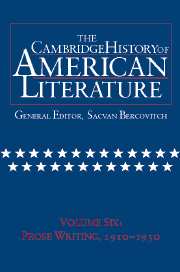Book contents
- Frontmatter
- Introduction
- A Cultural History of the Modern American Novel: Introduction
- 1 A Dream City, Lyric Years, and a Great War
- 2 Fiction in a Tme of Plenty
- 1 When the War Was Over: the Return of Detachment
- 2 The “Jazz Age” and the “Lost Generation” Revisited
- 3 The Perils of Plenty, or How The Twenties Acquired a Paranoid Tilt
- 4 Disenchantment, Flight, and The Rise of Professionalism in an Age of Plenty
- 5 Class, Power, and Violence in a New Age
- 6 The Fear of Feminization and The Logic of Modest Ambition
- 7 Marginality and Authority / Race, Gender, and Region
- 8 War as Metaphor: The Example of Ernest Hemingway
- 3 The Fate of Writing During the Great Depression
- Fictions of the Harlem Renaissance
- Ethnic Modernism
- Chronology
- Bibliography
- Index
2 - The “Jazz Age” and the “Lost Generation” Revisited
from 2 - Fiction in a Tme of Plenty
Published online by Cambridge University Press: 28 March 2008
- Frontmatter
- Introduction
- A Cultural History of the Modern American Novel: Introduction
- 1 A Dream City, Lyric Years, and a Great War
- 2 Fiction in a Tme of Plenty
- 1 When the War Was Over: the Return of Detachment
- 2 The “Jazz Age” and the “Lost Generation” Revisited
- 3 The Perils of Plenty, or How The Twenties Acquired a Paranoid Tilt
- 4 Disenchantment, Flight, and The Rise of Professionalism in an Age of Plenty
- 5 Class, Power, and Violence in a New Age
- 6 The Fear of Feminization and The Logic of Modest Ambition
- 7 Marginality and Authority / Race, Gender, and Region
- 8 War as Metaphor: The Example of Ernest Hemingway
- 3 The Fate of Writing During the Great Depression
- Fictions of the Harlem Renaissance
- Ethnic Modernism
- Chronology
- Bibliography
- Index
Summary
Of several descriptions of the culture of the twenties, two – F. Scott Fitzgerald’s “Jazz Age” and Gertrude Stein’s “Lost Generation,” the one stressing involvement, the other detachment – have proved most durable, and both have paid a price for their durability: they have lost much of their power to spark recognition. In the letters, diaries, and journals of the era as well as the published memoirs – Margaret Anderson’s My Thirty Years’ War (1930), Edith Wharton’s A Backward Glance (1934), Joseph Freeman’s An American Testament (1936), Mabel Dodge Luhan’s Movers and Shakers (1936), Robert McAlmon’s Being Geniuses Together (1938), Sylvia Beach’s Shakespeare and Company (1959), Janet Flanner’s An American in Paris (1940), Harold Loeb’s The Way It Was (1959), Matthew Josephson’s Life Among the Surrealists (1962), Ernest Hemingway’s A Moveable Feast (1964), and Malcolm Cowley’s Exile’s Return (1934) and A Second Flowering (1973), to name a few – anecdotes abound: of the lost “exiles” who shared Paris as a “moveable feast”; of Pound’s efforts to make things new; of Sherwood Anderson’s rejection of business for art; of Stein’s, Anderson’s, and Hemingway’s struggles to perfect their style; of Hemingway’s and Stein’s divisive competitiveness; of John Freeman’s, Dos Passos’s, and Genevieve Taggard’s lonely efforts to sustain the spirit of social reform by broadening the special disillusionment of the postwar years into a general disillusionment with the cultures of corporate capitalism; of the stunning effulgence, particularly in music and literature, in the flats, pubs, speakeasies, and cabarets of Harlem; of the rise that Zelda and Scott Fitzgerald shared and the crack-ups that divided them; of the suicides of writers as different as Dorothea and Gladys Cromwell, Harry Crosby, and Hart Crane; and of William Faulkner’s singular decision to return to the place of his birth, as a kind of resident exile who would always feel “at home” there, “yet at the same time … not at home.”
- Type
- Chapter
- Information
- The Cambridge History of American Literature , pp. 108 - 124Publisher: Cambridge University PressPrint publication year: 2002

